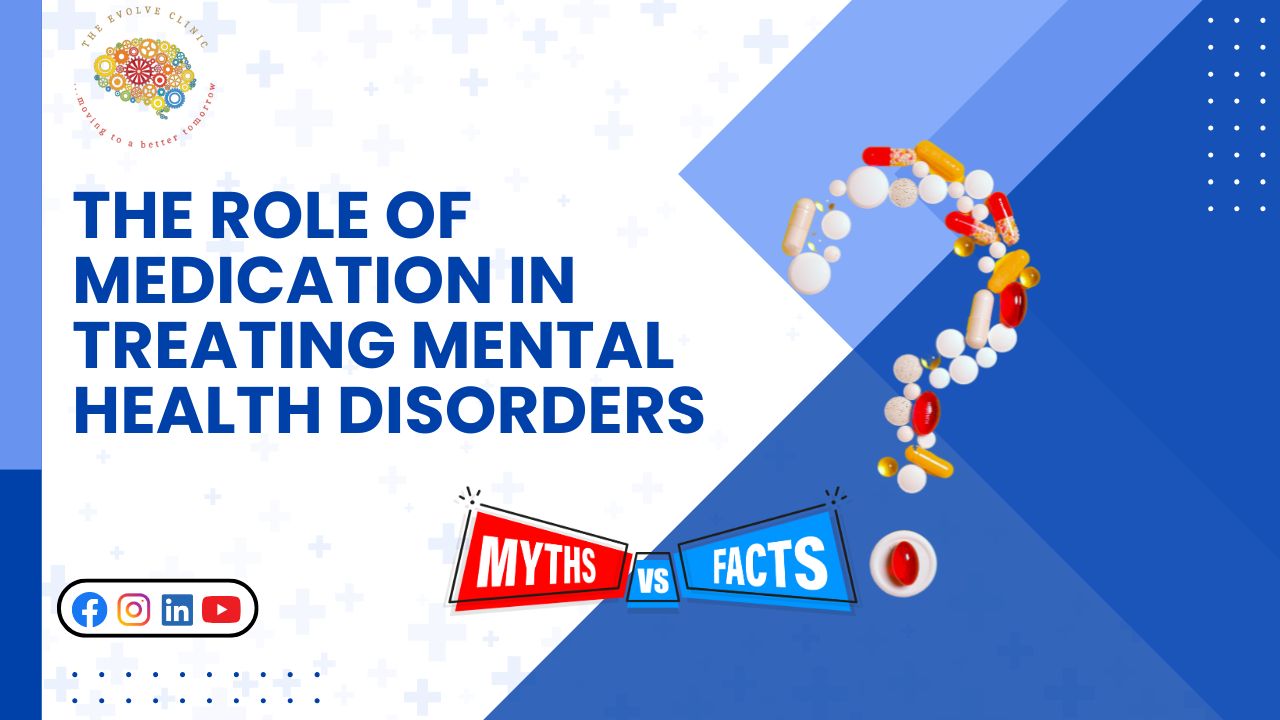
The Role of Medication in Treating Mental Health Disorders: Myths vs. Facts
Mental health disorders affect millions of people worldwide, yet misconceptions about treatment options, particularly medication, persist. Understanding the role of medication in managing these disorders is crucial for individuals seeking help, their families, and society as a whole. In this blog, we will explore common myths about psychiatric medications and provide factual insights to clarify their role in mental health treatment.
Understanding Mental Health Disorders
Mental health disorders encompass a wide range of conditions, including anxiety disorders, depression, bipolar disorder, schizophrenia, and more. These conditions can significantly impact an individual's quality of life, affecting their thoughts, feelings, and behaviors. While therapy, lifestyle changes, and support systems are vital components of treatment, medication can also play a crucial role in managing symptoms and improving overall functioning.
Myth 1: Medication is the Only Solution for Mental Health Disorders
Fact: Medication is often one part of a comprehensive treatment plan.
One of the most pervasive myths is that medication is the sole solution for mental health disorders. While medications can be effective in managing symptoms, they are typically most beneficial when combined with other forms of treatment, such as psychotherapy, lifestyle changes, and social support.
For example, cognitive-behavioral therapy (CBT) has been shown to be particularly effective for anxiety and depression. When used in conjunction with medication, individuals may experience more significant improvements in their mental health. A holistic approach that includes therapy, lifestyle modifications (such as exercise and diet), and medication can lead to better long-term outcomes.
Myth 2: All Psychiatric Medications Are Addictive
Fact: Not all psychiatric medications are addictive, and many are essential for treatment.
There is a common misconception that all psychiatric medications are addictive, leading to fears about starting treatment. While some medications, particularly certain anti-anxiety medications like benzodiazepines, can be habit-forming, many others, such as antidepressants and antipsychotics, are not addictive.
Selective serotonin reuptake inhibitors (SSRIs), for instance, are commonly prescribed for depression and anxiety and do not carry the same risk of addiction. It’s essential for patients to discuss their concerns with their healthcare providers, who can help clarify the risks and benefits of specific medications.
Myth 3: Medication Will Change My Personality
Fact: When prescribed correctly, medication should help stabilize mood and improve functioning without altering personality.
Another prevalent myth is that psychiatric medications will fundamentally change who you are. Many people fear that taking medication will dull their emotions or make them feel like a different person. In reality, the goal of medication is to alleviate symptoms and improve quality of life.
When medications are appropriately prescribed and monitored by healthcare professionals, they should help individuals regain a sense of balance and stability. For example, someone experiencing severe anxiety may find that medication helps reduce their symptoms, allowing them to engage more fully in life without feeling overwhelmed. The aim is not to erase emotions but to help individuals manage them more effectively.
Myth 4: Medication Works Immediately
Fact: Many psychiatric medications take time to become effective.
A common misconception is that psychiatric medications will produce immediate results. In reality, most medications require time to build up in the system and may take several weeks to show their full effects.
For instance, antidepressants like SSRIs typically take four to six weeks before patients notice significant improvements in their mood. It’s essential for individuals to be patient and maintain open communication with their healthcare providers during this period. If side effects or concerns arise, adjustments can be made to the treatment plan.
Myth 5: Once You Start Medication, You’ll Be on It Forever
Fact: Medication needs can change over time, and many individuals can eventually reduce or discontinue their use.
Another prevalent myth is that starting medication means committing to it for life. While some individuals may require long-term medication management, many others can successfully reduce or discontinue their medication over time, especially if they have developed coping strategies through therapy or if their symptoms have improved.
It’s crucial to work closely with a healthcare provider when considering changes to medication. Abruptly stopping medication can lead to withdrawal symptoms or a resurgence of mental health issues. A gradual tapering process, guided by a professional, is often the safest approach.
Myth 6: Medication is a "Quick Fix"
Fact: Medication is not a cure; it is a tool to manage symptoms.
While medication can significantly improve symptoms of mental health disorders, it is not a cure. Many individuals may experience fluctuations in their mental health, and medication can help manage these changes.
It’s important to view medication as one component of a broader treatment strategy. Engaging in therapy, practicing self-care, maintaining a support network, and making lifestyle changes are all critical elements that contribute to overall well-being.
Myth 7: Mental Health Medications Are Overprescribed
Fact: While there can be instances of overprescription, medication is often necessary for many individuals.
Concerns about over prescription are valid, and it is essential for healthcare providers to carefully evaluate each patient's needs. However, for many individuals, medication is a necessary part of their treatment plan.
Studies have shown that mental health disorders are often underdiagnosed and undertreated. In reality, many individuals who could benefit from medication do not receive it. It is crucial to strike a balance between responsible prescribing practices and ensuring that those who need medication have access to it.
Overall Summary
Mental health disorders are complex and multifaceted, and medication can play a vital role in treatment. By dispelling common myths and misconceptions, we can work towards a more informed and supportive environment for individuals seeking help. Remember, medication is not a one-size-fits-all solution, and it is essential to work closely with healthcare professionals to develop a personalized treatment plan that addresses your unique needs.
